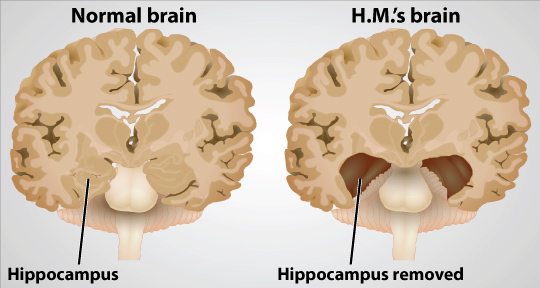One of the most studied cases in memory research involves the curious story of H.M. In the 1950s, a young man with initials H.M. underwent radical neurosurgery in order to treat his epileptic seizures. Because seizures result from uncontrolled electrical impulses in a defined area of the brain, his doctor logically reasoned that the surgical removal of that brain region would treat the epilepsy. Following the removal of large portions of the temporal lobes of H.M.’s brain (including most of the hippocampus), the frequency and severity of his seizures were significantly reduced.
However, it soon became evident that his memory was severely impaired by the surgery. After the surgery, H.M. could retain information in short-term memory for a few seconds but he was unable to convert this information into long-term storage. Furthermore, although he could retrieve memories formed before the surgery, he could not recall events thereafter. This phenomenon, termed anterograde amnesia, has been showcased in characters of several recent movies including Finding Nemo, 50 First Dates, and Memento.
In the case of H.M., the memory deficiency remained permanent. Even a half-century later, H.M. still leads a life of quiet confusion. He lives in a hospital but must be re-introduced to his doctors every day. He does not recognize terms such as “VCR” or “Jacuzzi” and other things that have been invented since his surgery. And though he remembers the date of his birthday, he typically underestimates his age when asked. In many ways, H.M.’s memory remains “trapped” in a world of a half-century ago. The study of H.M. and other unique medical patients continues to provide much insight into the biological mechanisms of memory.

Similarly to the case of H.M., alcohol causes anterograde amnesia, impairing an individual’s performance on memory tasks without affecting the retrieval of long-term memories. With low levels of alcohol, a drinker may experience problems in remembering the details of a particular conversation, phone numbers, or the names of newly introduced peers. However, as the amount of alcohol increases, the resulting memory impairments are much more significant, potentially resulting in a complete inability to remember critical events or large chunks of time (blackouts). This pattern of memory dysfunction resembles that of patients like H.M., suggesting that a similar region of the brain, the hippocampus, can be affected while drinking alcohol.